Related Research Articles
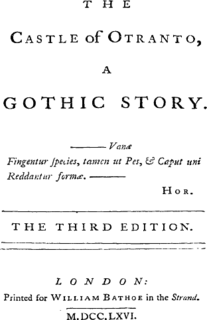
Gothic fiction, sometimes called Gothic horror in the 20th century, is a loose literary aesthetic of fear and haunting. The name is a reference to Gothic architecture of the European Middle Ages, which was characteristic of the settings of early Gothic novels. The first work to call itself Gothic was Horace Walpole's 1764 novel The Castle of Otranto, later subtitled "A Gothic Story". Subsequent 18th century contributors included Clara Reeve, Ann Radcliffe, William Thomas Beckford and Matthew Lewis. The Gothic also influenced poetry by Samuel Taylor Coleridge and John Keats. Its 19th century successes include Mary Shelley's Frankenstein and work by E. T. A. Hoffmann, Edgar Allan Poe and Charles Dickens. Later prominent works were Dracula by Bram Stoker, Richard Marsh's The Beetle and Robert Louis Stevenson's Strange Case of Dr Jekyll and Mr Hyde. Twentieth-century contributors include Daphne du Maurier, Stephen King, Shirley Jackson, Anne Rice and Toni Morrison.

Horror is a genre of speculative fiction which is intended to frighten, scare, or disgust. Literary historian J. A. Cuddon defined the horror story as "a piece of fiction in prose of variable length... which shocks, or even frightens the reader, or perhaps induces a feeling of repulsion or loathing". Horror intends to create an eerie and frightening atmosphere for the reader. Horror is often divided into the psychological horror and supernatural horror sub-genres. Often the central menace of a work of horror fiction can be interpreted as a metaphor for larger fears of a society. Prevalent elements include ghosts, demons, vampires, werewolves, ghouls, the Devil, witches, monsters, extraterrestrials, dystopian and post-apocalyptic worlds, serial killers, cannibalism, psychopaths, cults, dark magic, satanism, the macabre, gore and torture.

Joseph Thomas Sheridan Le Fanu was an Irish writer of Gothic tales, mystery novels, and horror fiction. He was a leading ghost story writer of his time, central to the development of the genre in the Victorian era. M. R. James described Le Fanu as "absolutely in the first rank as a writer of ghost stories". Three of his best-known works are the locked-room mystery Uncle Silas, the lesbian vampire novella Carmilla, and the historical novel The House by the Churchyard.
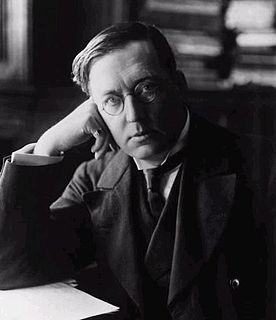
Montague Rhodes James was an English author, medievalist scholar and provost of King's College, Cambridge (1905–1918), and of Eton College (1918–1936). He was Vice-Chancellor of the University of Cambridge (1913–15).

Ramsey Campbell is an English horror fiction writer, editor and critic who has been writing for well over fifty years. He is the author of over 30 novels and hundreds of short stories, many of them winners of literary awards. Three of his novels have been filmed.
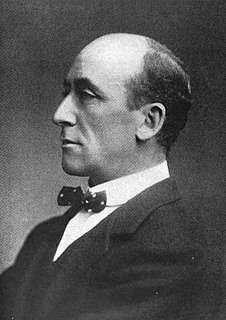
Algernon Henry Blackwood, CBE was an English broadcasting narrator, journalist, novelist and short story writer, and among the most prolific ghost story writers in the history of the genre. The literary critic S. T. Joshi stated, "His work is more consistently meritorious than any weird writer's except Dunsany's." and that his short story collection Incredible Adventures (1914) "may be the premier weird collection of this or any other century".

Jacques Martin Barzun was a French-American historian known for his studies of the history of ideas and cultural history. He wrote about a wide range of subjects, including baseball, mystery novels, and classical music, and was also known as a philosopher of education. In the book Teacher in America (1945), Barzun influenced the training of schoolteachers in the United States.
Splatterpunk is a movement within horror fiction originating in the 1980s, distinguished by its graphic, often gory, depiction of violence, countercultural alignment and "hyperintensive horror with no limits." The term was coined in 1986 by David J. Schow at the Twelfth World Fantasy Convention in Providence, Rhode Island. Splatterpunk is regarded as a revolt against the "traditional, meekly suggestive horror story". Splatterpunk has been defined as a "literary genre characterised by graphically described scenes of an extremely gory nature."

Weird fiction is a subgenre of speculative fiction originating in the late 19th and early 20th centuries. Weird fiction either eschews or radically reinterprets ghosts, vampires, werewolves, and other traditional antagonists of supernatural horror fiction. Writers on the subject of weird fiction, such as China Miéville, sometimes use "the tentacle" to represent this type of writing. The tentacle is a limb-type absent from most of the monsters of European folklore and gothic fiction, but often attached to the monstrous creatures created by weird fiction writers, such as William Hope Hodgson, M. R. James, and H. P. Lovecraft. Weird fiction often attempts to inspire awe as well as fear in response to its fictional creations, causing commentators like Miéville to paraphrase Goethe in saying that weird fiction evokes a sense of the numinous. Although "weird fiction" has been chiefly used as a historical description for works through the 1930s, it experienced a resurgence in the 1980s and 1990s, under the labels of New Weird and Slipstream, which continues into the 21st century.

A ghost story is any piece of fiction, or drama, that includes a ghost, or simply takes as a premise the possibility of ghosts or characters' belief in them. The "ghost" may appear of its own accord or be summoned by magic. Linked to the ghost is the idea of a "haunting", where a supernatural entity is tied to a place, object or person. Ghost stories are commonly examples of ghostlore.
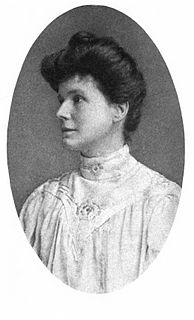
May Sinclair was the pseudonym of Mary Amelia St. Clair, a popular British writer who wrote about two dozen novels, short stories and poetry. She was an active suffragist, and member of the Woman Writers' Suffrage League. She once dressed up as a demure, rebel Jane Austen for a suffrage fundraising event. Sinclair was also a significant critic in the area of modernist poetry and prose, and she is attributed with first using the term 'stream of consciousness' in a literary context, when reviewing the first volumes of Dorothy Richardson's novel sequence Pilgrimage (1915–1967), in The Egoist, April 1918.

Supernatural fiction or supernaturalist fiction is a genre of speculative fiction that exploits or is centered on supernatural themes, often contradicting naturalist assumptions of the real world.
Theodore "Eibon" Donald Klein is an American horror writer and editor.
Herbert Russell Wakefield was an English short-story writer, novelist, publisher, and civil servant chiefly remembered today for his ghost stories.
Gary William Crawford was an American writer and small press publisher.
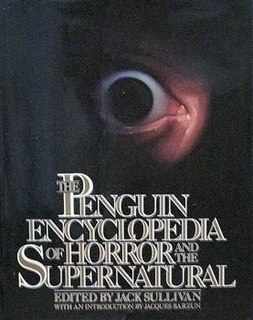
The Penguin Encyclopedia of Horror and the Supernatural is a reference work on horror fiction in the arts, edited by Jack Sullivan. The book was published in 1986 by Viking Press.
The Ghost Story Society was a not-for-profit literary society whose members shared an interest in supernatural fiction. Founded in Britain in 1988 by Rosemary Pardoe, Jeffrey Dempsey, David Cowperthwaite and Mark Valentine, it had an international membership and was later administered by joint organizers Christopher Roden and Barbara Roden, owners of Ash-Tree Press, with the assistance of David G. Rowlands, Richard Dalby, Jan Arter, and Roger Dobson. It has not been active since 2007.
Everett Franklin Bleiler was an American editor, bibliographer, and scholar of science fiction, detective fiction, and fantasy literature. In the late 1940s and early 1950s, he co-edited the first "year's best" series of science fiction anthologies, and his Checklist of Fantastic Literature has been called "the foundation of modern SF bibliography". Among his other scholarly works are two Hugo Award–nominated volumes concerning early science fiction—Science-Fiction: The Early Years and Science-Fiction: The Gernsback Years—and the massive Guide to Supernatural Fiction.
Swan River Press is an independent Irish publishing company dedicated to gothic, supernatural, and fantastic literature. It was founded in Rathmines, Dublin in October 2003 by Brian J. Showers. Swan River publishes contemporary fiction from around the world with an emphasis on Ireland's past and present contributions to the genre. They also issue the non-fiction journal The Green Book: Writings on Irish Gothic, Supernatural and Fantastic Literature, and sporadically organise the Dublin Ghost Story Festival.
"The Trial for Murder" is a short story written by Charles Dickens. It was originally published under the title "To Be Taken with a Grain of Salt" as a chapter in Dr. Marigold's Prescriptions in an extra Christmas volume of the weekly literary magazine, All the Year Round. It was later published in 1866 in a collection of ghost stories known as "Three Ghost Stories", along with "The Haunted House" and "The Signal-Man".
References
- ↑ Dirda, Michael. "Jacques Barzun—and Others", The American Scholar, November 2, 2012
- ↑ "Jack Sullivan", Rider University
- ↑ Sullivan, Jack. "With real and bogus footnotes" The New York Times, April 25, 1976
- ↑ Williams, B., "A Complete Guide for all lovers of horror" (Review of The Penguin Encyclopedia of Horror and the Supernatural). The Courier-Mail , January 31, 1987.
- ↑ ASCAP (October 15, 2007). "2007 ASCAP Deems Taylor Award" . Retrieved October 9, 2013.
- ↑ New York Philharmonic. "The Art of The Score: Film Week at the Philharmonic – Hitchcock!" . Retrieved October 9, 2013.